Today's Tarot for Marlon Brando
| The Cross and Triangle spread is a powerful means of understanding complex situations, developed by the Hermetic Order of the Golden Dawn. This spread is rich in occult and mystical symbolism, and one of our favorites here at Facade. The Lovecraft Tarot is a tribute to the gothic writings of the visionary H.P. Lovecraft. It is the deck of choice for explorers of the macabre, and for posing questions that should never be asked. If you would like your own copy of the Lovecraft Tarot, you can buy it now! |
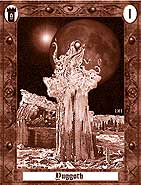 | The first card, the significator, is placed in the center of the cross. This card represents the prime energy manifest in your life. Ace of Sites (Yuggoth): The seed of prosperity and material gain - perhaps as yet unseen. A new foundation from which to turn your dreams into reality. The need to focus on the practical and understand the dynamics of the natural world. May represent a gift, document, inheritance, or an unexpected opportunity for physical achievement. |
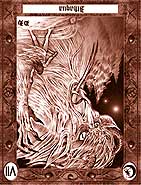 | The second card, placed above the significator, represents Air. It describes your spirit, process of thought, and the influence of reason. Ithaqua, when reversed: Ineffective use of force. Might turned against the weak or the righteous. Senseless violence and warmongering. Lack of discipline and poor direction fan the flames of a situation already out of control. Advance without consideration of the consequences for others. |
 | The third card, placed to the right of the significator, represents Fire. It describes your motivations, creative energies, and the influence of passion. Yog Sothoth, when reversed: Being confused and led astray from the true path. Spiritual deception. Overzealous and shallow-minded pursuit of the esoteric. Insecurity, conceit and self-destructiveness. The forces of nature unleashed. |
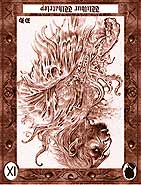 | The fourth card, placed below the significator, represents Water. It describes your emotions, meditations, and the influence of love. Nine of Man (Wilbur Whateley), when reversed: Vanity, conceit, and smugness in romance, friendship, or other relationships. Achieving what you always thought you wanted. Overindulging in food, drink, or the pleasures of the flesh. A state of joy and abundance that is shallow and fleeting. |
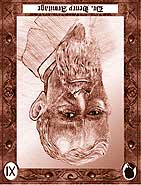 | The fifth card, placed to the left of the significator represents Earth. It describes your physical presence, position in life, and the influence of the material world. Page of Man (Dr. Henry Armitage), when reversed: The dark essence of water behaving as earth, such as a wellspring: An unexpected new relationship that is childish and foolish. An idle dreamer oblivious to the realities of the world. Moodiness, sad reflection, and retreat from society. Seduction and deception in personal and business relationships. |
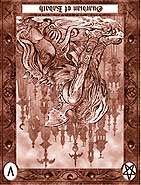 | At this point the cross is complete and the triangle is formed. The sixth card, placed on the bottom left of the triangle represents one of two opposing forces. Five of Artifacts (Guardian of Kadath), when reversed: Refusing to achieve success through personal degradation. Friendship maintained through the abandonment of a dishonorable gain. Slander and infamy avoided. |
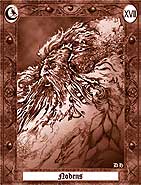 | The seventh card, placed on the bottom right of the triangle represents the force that opposes the bottom left card. These forces may be external, but they are frequently one's own inner archetypes in conflict. Nodens: New hopes and splendid revelations of the future. Insight, inspiration, courage and enlightenment of the spiritual self. Body and mind and converging towards the light at the end of a dark time. |
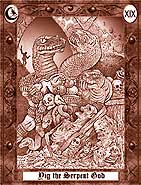 | The eighth card, the reconciler, is placed below the cross in the third vertex of the triangle. This is the force that will resolve the conflict between the bottom left and bottom right cards. By meditating on this force and bringing more of it into your life, you can bring the matter at hand to a swifter conclusion than would naturally occur. Yig the Serpent God: A time of contentment and freedom from restraints. Creative inspiration. Achievement, success, and warmth. Light and love in personal or business matters. Happiness and faithfulness in a relationship. |
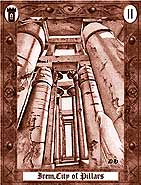 | The ninth and final card, placed in the center bottom of the triangle, represents the final outcome unless you change course. Two of Sites (Irem, City of Pillars): Balance and harmony achieved in a time of upheaval and transformation. Taking two steps forward for every one step back. Shifting the importance of projects and priorities to keep everything on track. A change in occupation or location. |
|
|




















